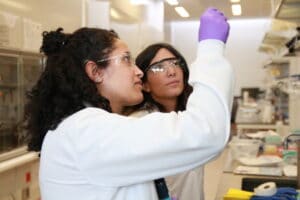Posted on June 28, 2022 in ASRC News, Featured News, Nanoscience Initiative

With a $3 million NSF grant, the Graduate Center will prepare diverse Ph.D. students for new workforce opportunities in biotech, clean energy, and other areas that are benefiting from bioinspired nanoscience.
From photosynthesis to the collective behavior of ants, natural phenomena inspire both discovery and innovation. Now, thanks to breakthroughs in computing, engineering, molecular biology, biochemistry, and complexity science, scientists are finding new ways to mimic and adapt nature, creating nanoscale materials and devices that bring powerful, sustainable solutions that advance health care, renewable energy, and space exploration.
With a new $3 million National Science Foundation (NSF) Research Training grant, faculty at the CUNY Graduate Center and its Advanced Science Research Center (CUNY ASRC) are launching Nanoscience Connected to Life to train diverse Ph.D. students for careers that integrate aspects of life sciences with nanoscience. This comprehensive program, which is connected to Understanding the Rules of Life (one of 10 NSF “big ideas”), will provide Graduate Center students who are in Biochemistry, Chemistry, and Physics Ph.D. programs and conducting bio-nanotechnology research with funding, research training, mentorship, and professional-development internships at industry and government labs.
“In combining training in world-class, cross-disciplinary nanoscience research with an equally valuable emphasis on career engagement, this needed program will prepare CUNY’s diverse graduate students to lay the groundwork for rewarding careers in high-demand industries,” said Chancellor Félix V. Matos Rodríguez. “The program’s great promise to drive innovation while expanding the participation of students from traditionally underrepresented groups in CUNY’s Ph.D. programs and diversifying the STEM fields, leverages the unparalleled strengths of the Graduate Center and of CUNY itself. We thank the NSF for its substantial investment.”
“This NSF Research Training program will strengthen the Graduate Center as a powerhouse of interdisciplinary science, particularly nanoscience and its applications,” said Robin L. Garrell, president of the Graduate Center. “Faculty at the Advanced Science Research Center and throughout our STEM doctoral and master’s programs are working across disciplines to find new ways to generate energy, diagnose and treat diseases, and address climate change. By engaging students of all backgrounds in cutting-edge, team-based research, we are preparing the next generation of scientists to lead innovation in academia and industry.”
“The nanoscale is the size range where biology’s functionality plays out at its most basic level,” said Professor Rein V. Ulijn, the principal investigator of the NSF grant, the founding director of the Nanoscience Initiative at the CUNY ASRC, and the Einstein Professor of Chemistry at Hunter College. “By bringing together knowledge from various disciplines, we can develop an understanding of the engineering approaches of biological systems. We can then apply this knowledge broadly to create new green technology that rivals the versatility of the structures of the living world. This is an area of much promise and growth, and now is the perfect time to significantly expand our research in it.” Read more
